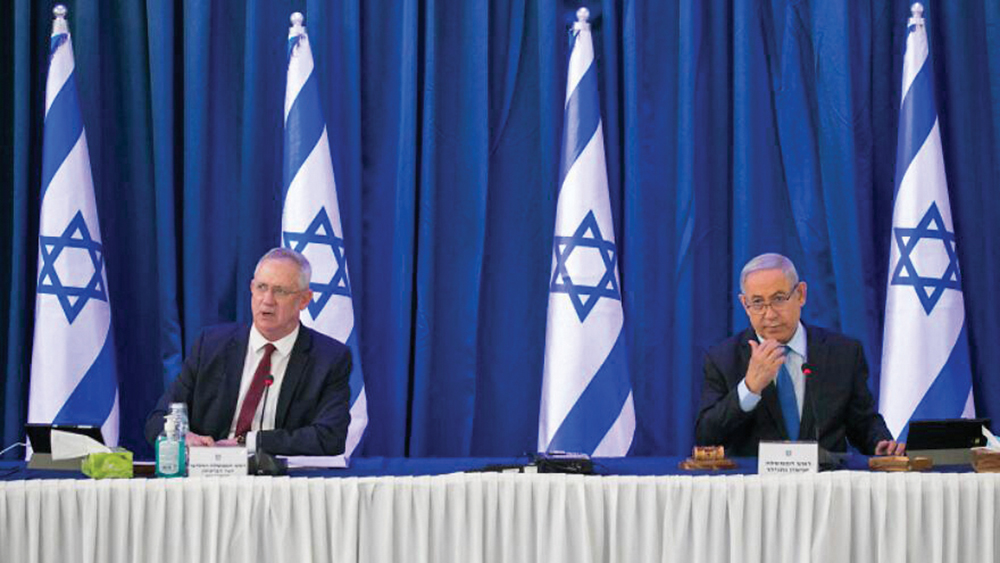The move reflects broad support for war against Hamas.
By David Isaac/JNS.org
Israeli Prime Minister Benjamin Netanyahu and National Unity Party leader Benny Gantz reached a deal to establish a unity government on Wednesday, October 11, the fifth day of Israel’s war against Hamas in the Gaza Strip.
According to the agreement, a war cabinet will be established to include Netanyahu, Gantz and Defense Minister Yoav Gallant, while Strategic Affairs Minister Ron Dermer and Knesset member Gadi Eisenkot, a member of Gantz’s party, will serve as observers.
Gantz, Eisenkot and MK Gideon Sa’ar will be sworn in as ministers without portfolio.
It was also agreed that the Gantz’s party would have a total of five ministers in the emergency government—Gantz, Eisenkot, Sa’ar and two others yet to be named.
News of the agreement followed a morning meeting between Netanyahu and Gantz at IDF headquarters in Tel Aviv. Gantz’s office said that all that was left was to finalize the details.
It had been clear for the last several days that a national unity government was in the offing, as all party leaders had called for it and public sentiment was behind it.
On Tuesday evening, the heads of regional authorities in the country’s south, which bore the brunt of Hamas’s Oct.7 surprise attack, addressed a letter to Netanyahu demanding a unity government.
“We, the heads of the authorities in the Negev, who are dealing with rocket fire on our settlement, infiltration by terrorists, many murdered and killed, missing, kidnapped and injured, call on you at this difficult time for the people and the State of Israel to immediately establish a national emergency government,” their letter stated.
On Tuesday morning, Netanyahu’s government endorsed the establishment of an “emergency national government” by unanimous agreement in a meeting of coalition party leaders. Their decision followed a national address by the prime minister on Saturday night, in which he called for Israel’s leadership to unite.
Already on Saturday evening, the day of the Hamas offensive, Netanyahu urged after a separate meeting with opposition leaders Yair Lapid of the Yesh Atid Party and Gantz that they enter a “broad emergency government, in the same format according to which the late opposition leader Menachem Begin joined the [Levi] Eshkol government on the eve of the Six-Day War.”
Lapid and Gantz responded positively. Lapid said that a unity government would send a message to Israel’s enemies and the world that Israel stands united behind the IDF.
However, Lapid also signaled that he would only join on condition that far-right members of Netanyahu’s coalition be sidelined or ousted, specifically Finance Minister Bezalel Smotrich of the Religious Zionism Party and National Security Minister Itamar Ben-Gvir of the Otzma Yehudit Party.
Ben-Gvir and Smotrich both expressed strong support for the formation of a national unity government, but they have balked at the idea that they should be left out of the decision-making process.
Ben-Gvir, visiting the southern city of Sderot on Wednesday, refused to answer media questions regarding whether he would still support a unity government if it meant his exclusion from the war cabinet, Channel 12 reported.
Officials in his office said on Tuesday that the minister opposes the establishment of any security forum beyond the current security cabinet, the channel reported.
Gantz set forth three conditions on Saturday when he first signaled he was “considering positively” the unity government proposal: 1. That the opposition would have substantial influence in the war-time decisions; 2. That a streamlined cabinet of up to five people would conduct the war; 3. That the unity government wouldn’t put forward any legislation not directly connected to the war effort.
Gantz indicated that he and fellow party member Gadi Eisenkot would have a seat on the cabinet. Both Gantz and Eisenkot are former IDF chiefs-of-staff.
According to Ynet, Gantz didn’t set conditions regarding who the coalition’s members in the cabinet would be, but assumed that Netanyahu wouldn’t appoint Smotrich or Ben-Gvir.
Following the meeting, opposition member Avigdor Liberman of the Yisrael Beiteinu Party sent a letter to Netanyahu signaling that he, too, was prepared to join a national unity government, on condition that the aim of the war would be the military and political destruction of Hamas.
“There must be a public commitment by the Prime Minister, the Minister of Defense and the IDF chief of staff to the people of Israel,” said Liberman.
“All three of them should announce in their own voice that the elimination of Hamas, the leaders of Hamas and the end of the ‘arrangements’ era are acceptable to them and these are the goals of the current conflict,” he wrote.
Liberman said the elimination of the Hamas leadership meant “wherever they are hiding,” including in the Gaza Strip, Lebanon, Malaysia and Qatar.
“One minute after this explicit announcement, I and the Yisrael Beiteinu faction joined the coalition,” he stated.
Liberman said it wasn’t necessary for Israel to re-occupy the Gaza Strip and that the IDF could leave after the mission was accomplished.













